

Aisha: A Life and Legacy - Cayla Wagner historia 2016. Aisha Bint Abi Bakr Siddique (RA) Note: This is a lecture that I give for non-Muslims.
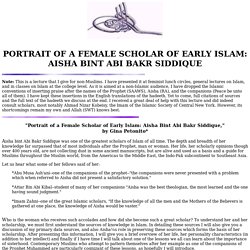
I have presented it at feminist lunch circles, general lectures on Islam, and in classes on Islam at the college level. As it is aimed at a non-Islamic audience, I have dropped the Islamic conventions of inserting praise after the names of the Prophet (SAAWS), Aisha (RA), and the companions (Peace be unto all of them). Legacy of Great Muslim Women Leaders - Australian Muslim Womens Association. ‘A’isha bint Abi Bakr and her Contributions to the Formation of the Islamic Tradition by Aisha Geissinger Ai. The Fifth Pillar of Islam: The Pilgrimage (Hajj) - The Religion of Islam. The Hajj (pilgrimage to Mecca) is the fifth of the fundamental Muslim practices and institutions known as the five pillars of Islam.
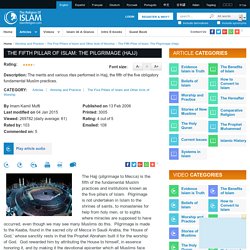
Pilgrimage is not undertaken in Islam to the shrines of saints, to monasteries for help from holy men, or to sights where miracles are supposed to have occurred, even though we may see many Muslims do this. Pilgrimage is made to the Kaaba, found in the sacred city of Mecca in Saudi Arabia, the ‘House of God,’ whose sanctity rests in that the Prophet Abraham built it for the worship of God. A journey through Hajj, Islam's special pilgrimage. Wrapped in white cloth, worshippers embark on the five-day pilgrimage, considered one of the five pillars of Islam.

All Muslims who are physically and financially able are required to make the journey to Mecca at least once in their lifetime. Many Muslim pilgrims, known as hajjis, converge on the city weeks before the start of the Hajj rituals. Religions - Islam: Hajj: pilgrimage to Mecca. Hajj: The importance of the pilgrimage to Mecca. What is the Hajj?
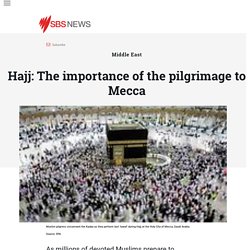
The Hajj is an annual journey to Mecca, a desert valley in western Saudi Arabia, that all able-bodied and financially capable Muslim adults are expected to make at least once in their lifetime. The meaning of Hajj. Explaining the Muslim pilgrimage of hajj : theconversation. Around 1.7 million Muslims have gathered this year in the holy city of Mecca in Saudi Arabia for the annual pilgrimage – the hajj.
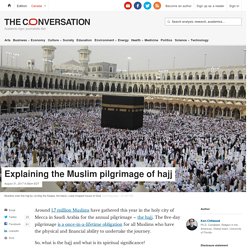
The five-day pilgrimage is a once-in-a-lifetime obligation for all Muslims who have the physical and financial ability to undertake the journey. Sexual ethics in islam 2016 edition. Sexual Ethics Explained 2016 Edition. GCSE Bitesize: Marriage. Islam, Sexual Ethics, and Community Conversations. Editors' Note: This article is part of the Patheos Public Square on the Spirituality of Sex.

Read other perspectives here. Sex is described as many things: it can be an act of passion for some, physical gratification for others, a necessity for procreation, an act of worship for people of faith, or some combination thereof. It is also a word and experience that is often loaded with many emotions: joy, love, and all too often, fear, shame, and stigma. One of the challenges of beginning this conversation is that historically, sex and sexuality have been seen as uncomfortable subjects across most racial, ethnic, and religious communities. Gender and Sexuality. WOMAN IN ISLAM. The Women of Islam. For his day, the Prophet Muhammad was a feminist.
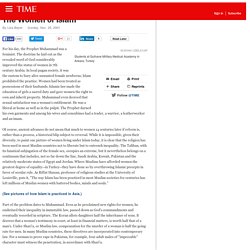
The doctrine he laid out as the revealed word of God considerably improved the status of women in 7th century Arabia. In local pagan society, it was the custom to bury alive unwanted female newborns; Islam prohibited the practice. Women had been treated as possessions of their husbands; Islamic law made the education of girls a sacred duty and gave women the right to own and inherit property. Muhammad even decreed that sexual satisfaction was a woman's entitlement. He was a liberal at home as well as in the pulpit. Of course, ancient advances do not mean that much to women 14 centuries later if reform is, rather than a process, a historical blip subject to reversal.
Women and Islam - Oxford Islamic Studies Online. In Islam, men and women are moral equals in God's sight and are expected to fulfill the same duties of worship, prayer, faith, almsgiving, fasting, and pilgrimage to Mecca.
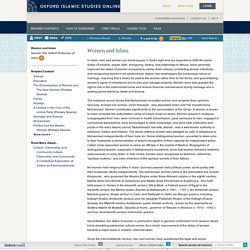
Islam generally improved the status of women compared to earlier Arab cultures, prohibiting female infanticide and recognizing women's full personhood. Islamic law emphasizes the contractual nature of marriage, requiring that a dowry be paid to the woman rather than to her family, and guaranteeing women's rights of inheritance and to own and manage property. Women were also granted the right to live in the matrimonial home and receive financial maintainance during marriage and a waiting period following death and divorce.
The historical record shows that Muhammad consulted women and weighed their opinions seriously. At least one woman, Umm Waraqah , was appointed imam over her household by Muhammad. Debates continue over the appropriate level of female participation in the public sphere. See also Hijab; Seclusion. Sexual Ethics in Islam and in the Western World. Important notice: The Ahlul Bayt DILP team wishes to inform the reader of some important points regarding this digitized text, which represents the English translation of a work originally written in Farsi.

Whereas no one can doubt the best intentions of the translator and the publishers in making this title accessible to an English speaking audience, the editing and digitization process of this book (carried out by the DILP Team) has revealed issues in the quality of translation. Based upon this fact, the DILP team has taken the liberty to make grammatical corrections to make the text more readable and less ambiguous; spelling mistakes and typographical errors have also been corrected and an attempt has been made to improve the highly non-standard use of transliteration of Arabic names and terms. The online text is not an exact reproduction of the original translation. Users wishing to see the translation as it was published should refer to printed copies available in bookshops.
Why Muslim Women Wear the Veil. In recent years, a small piece of cloth has managed to cause quite a stir.
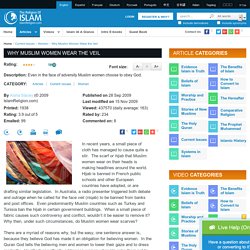
The scarf or hijab that Muslim women wear on their heads is making headlines around the world. Hijab is banned in French public schools and other European countries have adopted, or are drafting similar legislation.